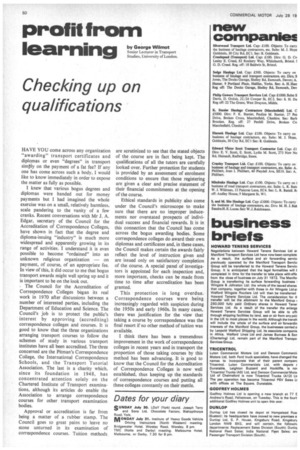Checking up on qualifications
Page 52

If you've noticed an error in this article please click here to report it so we can fix it.
HAVE YOU come across any organization "awarding" transport certificates and diplomas or even "degrees" in transport simply on the payment of a fat fee? If any one has come across such a body, I would like to know immediately in order to expose the matter as fully as possible.
I knew that various bogus degrees and diplomas were handed out for money payments but I had imagined the whole exercise was on a small, relatively harmless, scale pandering to the vanity of a few cranks. Recent conversations with Mr J. A. Edgar, secretary of the Council for the Accreditation of Correspondence Colleges, have shown in fact that the degree and diploma-issuing "industry" is much more widespread and apparently growing in its range of activities. I understand it is even possible to become "ordained" into an unknown religious organization — on payment, of course, of an appropriate fee. In view of this, it did occur to me that bogus transport awards might well spring up and it is important to be on the look out.
The Council for the Accreditation of Correspondence Colleges began its real work in 1970 after discussions between a number of interested parties, including the Department of Education and Science. The Council's job is to protect the public's interest by approving (accrediting) correspondence colleges and courses. It is good to know that the three organizations arranging transport courses to follow the schemes of study in various transport institutes have all been accredited. The three concerned are the Pitman's Correspondence College, the International Correspondence Schools, and the Transport Tutorial Association. The last is a charity which, since its foundation in 1948, has concentrated attention solely on the Chartered Institute of Transport examinations, although its articles do enable the Association to arrange correspondence courses for other transport examination bodies.
Approval or accreditation is far from being a matter of a rubber stamp. The Council goes to great pains to leave no stone unturned in its examination of correspondence courses. Tuition methods are scrutinized to see that the stated objects of the course are in fact being kept. The qualifications of all the tutors are carefully looked over. Further protection for students is provided by an assessment of enrolment conditions to ensure that those registering are given a clear and precise statement of their financial commitments at the opening of the course.
Ethical standards in publicity also come under the Council's microscope to make sure that there are no improper inducements nor overstated prospects of individual success and financial rewards. It is in this connection that the Council has come across the bogus awarding bodies. Some correspondence colleges do award their own diplomas and certificates and, in these cases, the Council makes certain the awards fairly reflect the level of instruction given and are issued only on satisfactory completion of the course. A special panel of investigators is appointed for each inspection and, more important, checks can be made from time to time after accreditation •has been granted.
This protection is long overdue. Correspondence courses were being increasingly regarded with suspicion during the 1950s and early 1960s. In many cases, there was justification for the view that taking a course by correspondence was the final resort if no other method of tuition was available.
I think there has been a tremendous improvement in the work of correspondence colleges in recent years and in transport the proportion of those taking courses by this method has been advancing. It is good to know that the Council for the Accreditation of Correspondence Colleges is now well established, thus keeping up the standards of correspondence courses and putting all these colleges constantly on their mettle.




























































































